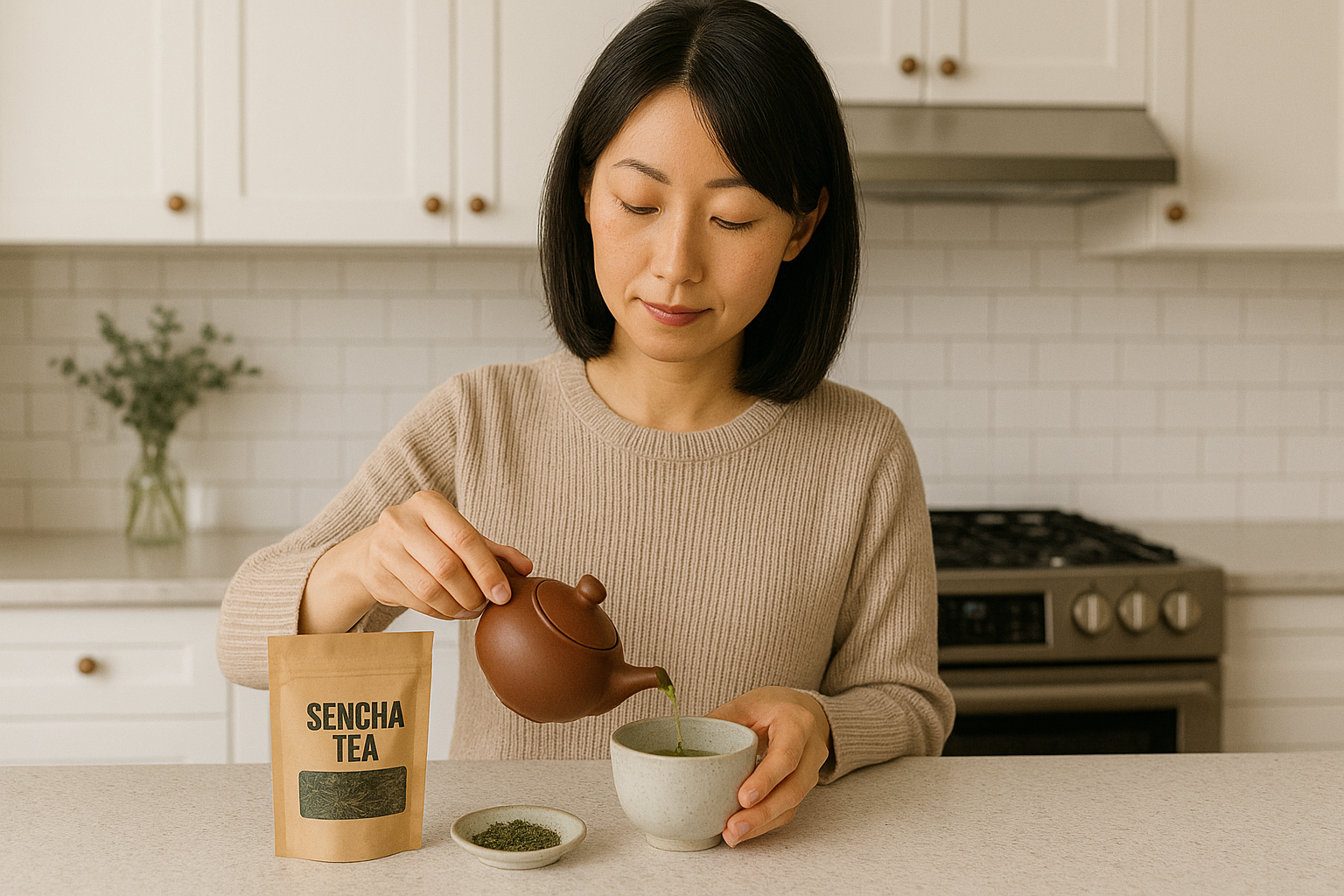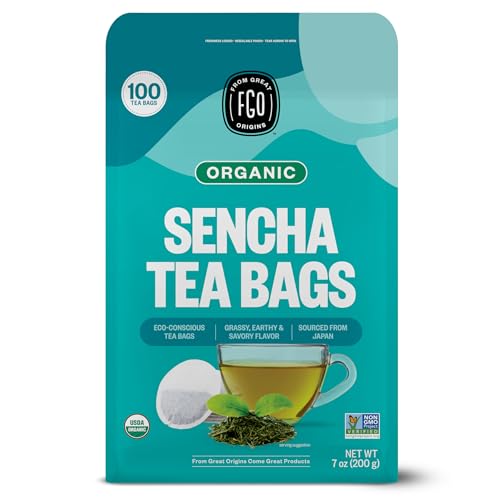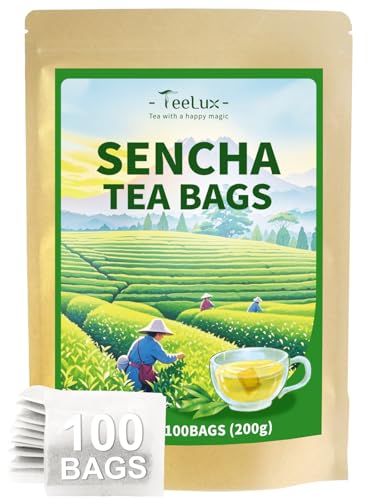9 Health Benefits of Sencha Tea
Sencha is the most popular type of green tea in Japan and one of the most widely consumed teas worldwide. Made from the leaves of the Camellia sinensis plant, it is steamed, rolled, and dried to preserve its natural compounds. Unlike matcha, which is powdered, sencha is brewed from whole leaves, giving it a distinct flavor and nutrient profile.
Rich in antioxidants such as catechins and vitamin C, sencha has been studied for its potential to support heart health, brain function, metabolism, and immune defense. It also contains moderate caffeine levels that provide steady energy without overwhelming the nervous system. Regular consumption of sencha may therefore promote overall wellness and help protect against chronic disease (1).

What is Sencha?
Sencha is a steamed green tea made from the young leaves of the Camellia sinensis plant. After harvesting, the leaves are briefly steamed to prevent oxidation, then rolled and dried into needle-like shapes. This process helps preserve their bright green color, fresh aroma, and high levels of antioxidants.
Compared with matcha, which is shade-grown and ground into powder, sencha is sun-grown and brewed as loose leaves. It is especially rich in catechins, vitamin C, and other plant compounds that contribute to its health benefits. In Japan, sencha is enjoyed daily and accounts for nearly 80% of all green tea consumed, making it both a cultural staple and a source of important dietary antioxidants (2).
Here are 9 evidence-based health benefits of drinking sencha tea.
1. High in Antioxidants
Sencha is a powerful source of antioxidants, especially catechins such as epigallocatechin gallate (EGCG). These plant compounds help neutralize free radicals — unstable molecules that can damage cells and accelerate aging. By reducing oxidative stress, antioxidants in sencha may lower the risk of chronic conditions including cardiovascular disease, type 2 diabetes, and certain cancers.
In addition to catechins, sencha also provides vitamin C, which enhances immune function and works synergistically with other antioxidants. Drinking sencha regularly can therefore support the body’s natural defense systems, helping maintain cellular health and long-term vitality (3).
2. Supports Heart Health
Heart health is one of the most studied benefits of green tea, and sencha offers many of the same advantages. Research suggests that catechins in sencha may help reduce LDL cholesterol, improve blood vessel flexibility, and promote better circulation. These effects can reduce the risk of arterial plaque buildup, which is a major contributor to heart disease.
Population studies have also found that people who consume green tea regularly tend to have lower rates of cardiovascular problems. Since sencha is one of the most commonly consumed forms of green tea in Japan, it is often linked with these protective effects. Including sencha in your diet alongside balanced nutrition and physical activity may therefore support long-term cardiovascular wellness (4).
3. Boosts Brain Function
Sencha contains both caffeine and the amino acid L-theanine, a combination known to enhance focus, memory, and attention. Caffeine provides mental stimulation, while L-theanine promotes calmness and reduces stress, resulting in a balanced state of alertness often described as “calm focus.” This makes sencha a useful drink for studying, working, or tasks that require sustained concentration.
Research on green tea consumption has shown improvements in reaction time, working memory, and overall cognitive performance. Some studies even suggest that regular intake may help protect the brain against age-related decline, such as memory loss. By delivering this unique blend of caffeine and L-theanine, sencha offers both short-term mental clarity and potential long-term brain health benefits (5).
4. Strengthens the Immune System
Sencha is rich in compounds that support immune defense, particularly catechins and vitamin C. Catechins have been studied for their antimicrobial and antiviral properties, which may help the body fight infections more effectively. Vitamin C, meanwhile, is essential for immune cell function and overall resistance to illness.
Drinking sencha regularly can therefore strengthen the body’s natural defenses. In addition to supporting everyday immunity, its antioxidants may also reduce inflammation, further helping the body respond to environmental stressors and pathogens. For those looking for a natural way to boost immune health, sencha provides a simple and beneficial option (6).
5. Promotes Healthy Digestion
Sencha may also support digestive health thanks to its polyphenols, which have anti-inflammatory and antimicrobial properties. These compounds can help balance gut bacteria and reduce irritation in the digestive tract, contributing to smoother digestion and overall gut wellness. Its mild caffeine content can also gently stimulate the digestive system, supporting bowel regularity.
For many people, sencha feels lighter on the stomach compared with stronger teas or coffee, making it a soothing option after meals. Its catechins have been studied for their potential to reduce harmful bacteria in the gut while supporting beneficial microbes. Drinking sencha as part of your daily routine may therefore contribute to a healthier digestive system (7).
6. Supports Weight Management
Green tea is well known for its link to weight management, and sencha provides many of the same benefits. Catechins, especially EGCG, may increase fat oxidation and boost calorie burning, while caffeine can enhance energy expenditure. Together, these compounds create a mild but meaningful metabolic boost that may aid in maintaining a healthy weight.
Studies suggest that green tea catechins, when combined with exercise and a balanced diet, can lead to modest reductions in body weight and body mass index (BMI). While sencha is not a quick fix for weight loss, replacing high-calorie beverages with a cup of sencha may support weight management goals in a natural and sustainable way (8).
7. May Help Regulate Blood Sugar
Sencha may play a role in maintaining balanced blood sugar levels. Catechins in green tea have been studied for their ability to improve insulin sensitivity and regulate glucose metabolism. This means that drinking sencha may help reduce spikes in blood sugar after meals, supporting more stable energy levels throughout the day.
Some clinical studies have found that regular green tea consumption is linked to lower fasting blood sugar and reduced risk of developing type 2 diabetes. While sencha alone is not a treatment, including it as part of a healthy diet and active lifestyle may contribute to better long-term metabolic health (9).
8. Promotes Healthy Skin
Sencha contains antioxidants and vitamin C, both of which are beneficial for skin health. Antioxidants protect skin cells from oxidative stress caused by UV rays and pollution, factors that accelerate aging. Vitamin C supports collagen production, which is important for maintaining skin elasticity and a youthful appearance.
Regularly drinking sencha may help reduce skin damage and support a clearer, healthier complexion. Some evidence suggests that catechins in green tea can also improve hydration and reduce inflammation, making sencha a gentle way to nourish the skin from the inside out (10).
9. Provides Gentle Energy
One of the reasons sencha is so widely enjoyed in Japan is its balanced caffeine content. A cup of sencha typically contains less caffeine than coffee but enough to provide a mild boost in alertness and energy. This makes it a great option for people who want steady focus without the jitteriness or sudden crash that can follow stronger caffeinated drinks.
The natural combination of caffeine and L-theanine in sencha also helps sustain energy in a calm and controlled way. Instead of the overstimulation associated with coffee, sencha promotes gentle alertness, making it suitable for morning routines, work breaks, or even afternoon refreshment.
Side Effects and Risks
While sencha is safe for most people, drinking too much can lead to side effects due to its caffeine content. These may include restlessness, difficulty sleeping, or an upset stomach in those who are sensitive. It is best to limit intake to 2–3 cups per day if you are caffeine-sensitive.
Like other green teas, sencha also contains tannins, which can reduce the absorption of iron from plant-based foods. Drinking sencha between meals instead of during meals may help minimize this effect. Choosing high-quality, organic sencha can also reduce the risk of pesticide or contaminant exposure.
How to Make Sencha Tea
Preparing sencha the right way helps preserve its delicate flavor and beneficial compounds. Here are simple steps to make the perfect cup:
- Measure the tea – Use 1 teaspoon (about 2 grams) of sencha leaves per cup.
- Heat the water – Aim for 160–175°F (70–80°C). Avoid boiling water, as it can make the tea taste bitter.
- Steep the leaves – Pour hot water over the leaves and steep for 1–2 minutes. A shorter steeping time brings out a lighter flavor, while a longer one creates a stronger brew.
- Strain and enjoy – Pour into a cup and savor the fresh, grassy flavor.
Sencha leaves can often be steeped more than once. The second infusion typically has a milder, sweeter taste, making it enjoyable in a different way.
Frequently Asked Questions
Yes, sencha contains caffeine, though generally less than coffee and slightly less than matcha.
Sencha is brewed from whole, steamed leaves, while matcha is a powdered form of shade-grown leaves that you consume entirely.
Yes, 1–3 cups daily is safe for most people and may support long-term wellness.
Sencha has a fresh, grassy flavor with mild sweetness and a slightly astringent finish.
It may support weight management when paired with a healthy diet and exercise, but it is not a quick fix.
The Bottom Line
Sencha is Japan’s most popular green tea for a reason. It is rich in antioxidants, provides steady energy, and supports overall wellness. Research suggests it may benefit heart health, brain function, digestion, blood sugar balance, and even skin vitality.
Gentle on the stomach and versatile enough for daily enjoyment, sencha is a simple yet powerful way to support a healthier lifestyle. When consumed in moderation, it can be both a refreshing drink and a natural ally for long-term health.


